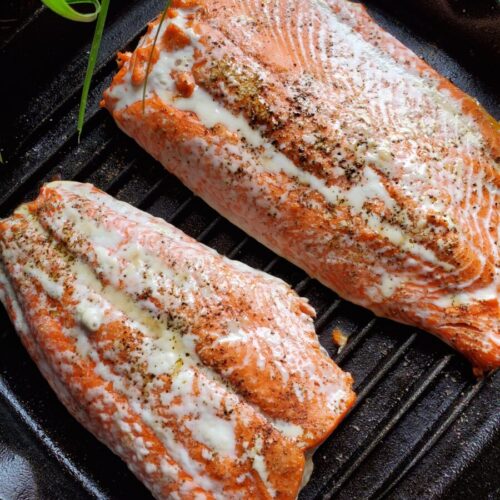
Baked Salmon w/ Olive Oil
The majority of the time I bake salmon with lemon, salt, pepper, and just a little bit of olive oil. But I'm making seafood chowder and that flavor profile isn't necessarily what I'm going for! So, for a little less citrus and a little bit more versatile recipe, today I'm baking salmon on a cast iron griddle in the oven. This also makes for a great substitute when you don't actually have lemons or other citrus on hand. Many a time I think that I have plenty only to get home and find out that I should have picked up a few more! But fear not. Salmon can still be made. Although it does help to cut it into slightly smaller pieces than to cook the entire fillet whole to get a more even cook.
Equipment
- Oven
- Cast Iron Griddle or Baking Sheet
Ingredients
- 1 fillet salmon
- dollop olive oil
- dash salt
- dash pepper
Instructions
- Preheat oven to 450 degrees Fahrenheit.
- Meanwhile, let the salmon rest until it reaches room temperature.I usually let it sit while the oven preheats. However, for particularly large fillet's, you may need to remove the salmon from the oven before you preheat it.
- Place salmon, skin side down, on a baking sheet.I use a pretty well seasoned cast iron griddle, so I don't add any oil beforehand. If you're using an actual baking sheet, though, you're probably going to want to oil the pan to keep the salmon from sticking.
- Lightly drizzle with olive oil and sprinkle with salt and pepper.
- Bake for about 8-10 minutes for smaller salmon fillets and about 15-20 minutes for larger ones. The salmon should flake easily with a fork.The general rule of thumb is to bake for 4-6 minutes per half inch of salmon. Although I've never gotten out a ruler and measured the thickness of fish! Nor do I find this the most helpful way to cook seafood. No two fillets, even of the same size, are going to cook in exactly the same amount of time. It's better to look for the color changing to a lighter pink hue and it flakes with a fork.
- Let rest for 5-10 minutes until adding to soup or stew. Salmon will also keep in the refrigerator for several days if you'd like to make it ahead of time.
Tips, Tricks, & Notes
- For more information on baking salmon, check out my articles on The Fundamentals of Oven Baked Salmon and Barbecue Salmon. I'm particularly fond of cooking on a well-seasoned cast iron griddle because you don't need additional oil or foil to to keep it from sticking. But there are certainly ways around this if you don't want to dedicate an entire cast iron pan to fish! Cooking salmon is also more of an art than a science. No two filets are going to cook in the exact same amount of time and there are definitely some tips and tricks to nailing the cook on fish.